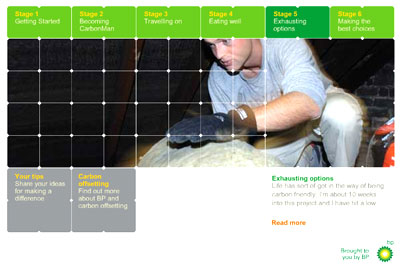
Published on Guardian Unlimited
I'M ABOUT 10 weeks into this project and I have hit a low. I moved last week, into a barn of a place, with 10-foot windows and 12-foot ceilings. I am wearing a jumper now and my hands are cold typing. It's totally impractical for winter in Britain, but I fell for the space - two massive rooms - and it's relatively cheap for what it is as it hasn't been done up since the 1930s.
So no central heating, and wafer-thin glass, and no gas: just electricity to power storage heaters and plug-in radiators. I have to go back to square one and switch to ecotricity again to become carbon friendly. And don't mention the idea of conserving any heat - the wind is whistling through already and it's only Halloween. Any major insulation projects will have to be done by the landlord, and that's unlikely as he's just desperate to sell the whole block and immigrate to Australia.
Life has sort of got in the way of being carbon friendly. My mum's mum died a couple of months ago and that has meant lots of shuttling about in vans and cars to move bits of furniture, pick up chairs, and get stuff out of storage. The heating in her place is always on, and there's an electric heater on permanently in the garage now, trying to keep the storage stuff from getting damp.
I did a shift at the Guardian website and bumped into the Environment editor. "So are you living in a tent, Ed?" she asked me. To be honest, no, I said. Life has to go on, I told her. I have to work, I have to eat, I have to travel around and that uses up energy and burns fossil fuels. And I'm not going to feel guilty about that.
What, if anything, this project has taught me so far is that there is only so much you can do as an individual. Yes, you can have a big impact by insulating your home, being energy efficient, making carbon-friendly purchasing decisions and switching to green energy, but then it stops. You have to have a life.
My brother and his wife had a baby in the summer. It was at the start of this project. I asked them about using reusable nappies versus disposable. Both are very ecologically aware, but as my sister-in-law said "We were going to sign up to a reusable scheme, but then he arrived and it was 'Get the disposables!'"
Struggling to get a pram into the boot of my brother's borrowed car as I helped them to move a month after the baby was born, he said, "Yeah, I want to get a four-wheel drive." I can see why - babies come with so much stuff, and you need a big vehicle to get it all in. A couple of kids and you need a people carrier.
People want to do the right thing, but then climate and carbon is still a bit abstract and the reality of shuttling your family around is very real.
A friend came to London from Barcelona to stay the night. We talked about food. I had just done the whole supermarket-versus-local thing. She told me in Spain you can only get seasonal and Spanish produce. "I went to buy sweet potatoes and they all said, 'No, it's August.'" It took her four shops to work it out: sweet potatoes are a winter food.
It depressed me even more. "It's a cultural thing," she said. "It's only the English in Europe who demand seasonal food all year." I'm not too sure about that, but I get her point - we are addicted to supermarkets as a nation. And yes, I have been buying local and organic but it costs a lot more: 69p for Spanish cherry tomatoes versus 99p for English ones. It's madness. Even the farmers' market leaves me cold: it just feels so elitist and smacks of Tuscan villas and summers in Provence, darling. It's not really a replacement for any supermarket, it's just an extra choice for the well-heeled consumer.
And then there is the fact that climate change is at the top of the political agenda - in the UK at least. It means acres of print devoted to "if I were king" articles by hot-air columnists about what needs to be done "Right now to stop global warming before I head to Orvieto for Christmas".
Environmentalists must be both happy and dismayed, thinking "we have seen this all before". While moving I found an old Friends of the Earth pamphlet: Turning down the heat - strategies for surviving the greenhouse effect. It covers things like biofuels, alternative energy from wind and solar, transport, air travel, lightbulbs, and a What You Can Do section which has as its top priority insulating the loft. Printed on 100% recycled paper, it was produced in September 1990. Every decade has its Green spikes and perhaps this is just another one of those. I hope not.







0 comments:
Post a Comment